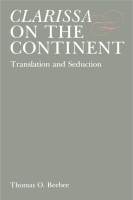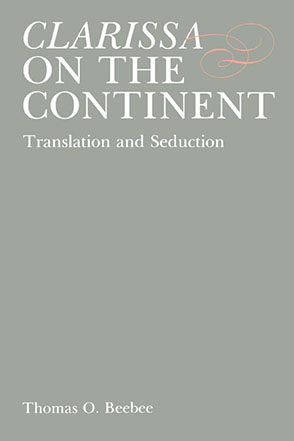Clarissa on the Continent
Translation and Seduction
Thomas O. Beebee
“No one can read this book with any degree of care and not find a stream of useful perceptions (and information) about Beebee’s tricorned eighteenth-century universe (England, France, and Germany). Not that the book is limited to eighteenth-century matters: both the use and discussion of theory, throughout the manuscript, and the good final chapter, in which a historical overlay is added, broaden the scope and utility of Beebee’s work, making it challenging and important reading for anyone interested in Richardson or the eighteenth-century, in translation theory and practice, in the comparative history of the novel, and also in the relevance and even the truth of much of modern literary theory.”
- Description
- Reviews
- Bio
- Subjects
This study uses translations in order to interpret Clarissa, to show how the basis for the novel's reception on the Continent was laid, and to explore the differences and interactions among three literary and cultural systems of the eighteenth century. The close examination of these two important translations enable the formulation of not only a theory of creative vs. preservative translation but also the interconnections between literary theory and translation theory. Beebee also looks at later translations of Clarissa as products of literary and historical change and at Prévostian strategies of the novel.
“No one can read this book with any degree of care and not find a stream of useful perceptions (and information) about Beebee’s tricorned eighteenth-century universe (England, France, and Germany). Not that the book is limited to eighteenth-century matters: both the use and discussion of theory, throughout the manuscript, and the good final chapter, in which a historical overlay is added, broaden the scope and utility of Beebee’s work, making it challenging and important reading for anyone interested in Richardson or the eighteenth-century, in translation theory and practice, in the comparative history of the novel, and also in the relevance and even the truth of much of modern literary theory.”
Thomas Beebee is Assistant Professor of Comparative Literature and German at The Pennsylvania State University.
Mailing List
Subscribe to our mailing list and be notified about new titles, journals and catalogs.




